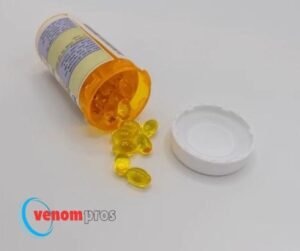
Tessalon Perles: Often Prescribed but Potentially Dangerous
introduction
Tessalon Perles (benzonatate) is a commonly prescribed cough suppressant that has been available in the United States since the 1950s. It is frequently used to treat symptoms associated with the common cold, respiratory infections, or other conditions that cause persistent coughing. Benzonatate works by numbing certain receptors in the respiratory system, which helps reduce the urge to cough. While Tessalon Perles is an effective medication for managing coughs, it also carries risks—especially if misused or taken inappropriately. Despite its common use, it is important to be aware of its potential dangers, especially in vulnerable populations such as children, the elderly, and people with certain health conditions.
This article explores how Tessalon Perles works, the conditions for which it is prescribed, its benefits, and the potential dangers it poses if not used as directed.

How Tessalon Perles Works
Tessalon Perles, with its active ingredient benzonatate, functions as a non-opioid cough suppressant. It works by numbing the stretch receptors in the lungs and airways. These receptors are responsible for triggering the cough reflex, which typically occurs when the body senses an irritant in the respiratory tract. By desensitizing these receptors, benzonatate suppresses the coughing impulse, providing relief to patients suffering from persistent coughs.
One of the key advantages of benzonatate is its non-narcotic nature, meaning it doesn’t carry the risk of addiction like opioid-based cough suppressants (e.g., codeine). Additionally, unlike many over-the-counter cough medications, it doesn’t induce drowsiness, making it a preferred option for patients who need to maintain alertness during the day.
However, despite its efficacy, benzonatate can be a double-edged sword, especially when misused or taken inappropriately.
Common Conditions for Prescribing Tessalon Perles
Physicians prescribe Tessalon Perles to manage coughs that stem from various underlying conditions, including:
Common cold: Persistent coughs resulting from viral infections like the common cold are a frequent reason for benzonatate prescriptions.
Bronchitis: Inflammation of the bronchial tubes can lead to chronic coughing. Tessalon Perles helps reduce the severity and frequency of coughing episodes.
Pneumonia: Though less common, benzonatate is sometimes used in cases of pneumonia to alleviate coughs associated with lung infections.
Asthma or Chronic Obstructive Pulmonary Disease (COPD): For patients with chronic lung diseases, benzonatate may be prescribed to help control frequent and debilitating coughing fits.

.
Risks and Side Effects
While Tessalon Perles is generally well-tolerated by most patients, it is not without its side effects. Common side effects include:
Dizziness
Drowsiness
Headache
Constipation
Nausea
Chest numbness
Choking sensation
Hallucinations
Severe allergic reactions, such as anaphylaxis
One of the most concerning risks of Tessalon Perles is its potential toxicity, particularly in children. The medication is packaged in soft gel capsules, which can be mistaken for candy by young children. Even small doses can be life-threatening in children under 10. Symptoms of overdose include restlessness, tremors, convulsions, and even death.
In 2010, the FDA issued a warning about the dangers of benzonatate in young children after several cases of overdose were reported. The warning emphasized that the drug should never be prescribed for children under 10 and that parents should be vigilant in keeping it away from their kids.
Potentially Dangerous Drug Interactions
Like many medications, Tessalon Perles can interact negatively with other drugs. Patients taking medications that depress the central nervous system (such as sedatives, tranquilizers, or alcohol) should use caution when taking benzonatate, as the combination can enhance the depressant effects, leading to excessive drowsiness, impaired motor skills, or respiratory depression.
Additionally, the drug should not be used alongside other cough suppressants unless specifically directed by a physician. Combining multiple medications designed to suppress coughing can lead to complications such as difficulty breathing, reduced oxygen intake, and other respiratory issues.
Patients with a history of allergic reactions to local anesthetics, such as procaine or tetracaine, should avoid benzonatate, as the drug is chemically similar to these anesthetics and may trigger an allergic response.

Overdose and Misuse
Perhaps the most serious risk associated with Tessalon Perles is overdose, which can occur not only in children but also in adults. Intentional misuse, such as taking extra doses in an attempt to speed up symptom relief, can lead to life-threatening consequences. Symptoms of overdose can manifest within 15 to 20 minutes of ingestion and may include:
Seizures
Cardiac arrest
Respiratory failure
Coma
Treatment for benzonatate overdose typically involves hospitalization, with medical professionals providing supportive care such as seizure management, respiratory support, and cardiac monitoring.
The speed with which overdose symptoms can develop makes it critical for patients to strictly adhere to prescribed dosages. The usual adult dosage is 100 to 200 mg, taken up to three times a day as needed, with a maximum dosage of 600 mg per day.

Safer Alternatives
For patients who are at higher risk for complications or those who may be concerned about the potential dangers of benzonatate, there are several alternative treatments available for managing coughs. Some of the safer options include:
Dextromethorphan (DM): An over-the-counter cough suppressant commonly found in products like Robitussin or Delsym, DM is less potent than benzonatate but carries fewer risks of severe side effects.
Honey: Studies have shown that honey can be as effective as some over-the-counter cough medications, especially for children. It is a natural remedy that soothes the throat and reduces coughing.
Saline nasal sprays and steam inhalation: These can help relieve congestion, which may alleviate the need for cough suppression.
Patients should always consult with their healthcare provider to determine the most appropriate and safest treatment for their condition.
Conclusion
Tessalon Perles is a valuable tool in managing persistent coughs, but it is not without risks. Its ability to suppress the cough reflex can bring much-needed relief to patients, but improper use or accidental ingestion—particularly by children—can lead to dangerous or even fatal consequences. Patients prescribed this medication should be well-informed about its proper usage, potential side effects, and the serious risks associated with overdose
Also read this;>“The Science of Poisons: How Toxicologists Detect and Neutralize Harmful Substances”
Also read this;>Astro’s Playroom Celebrated Astro Bot’s Debut in an Amazing Way.






